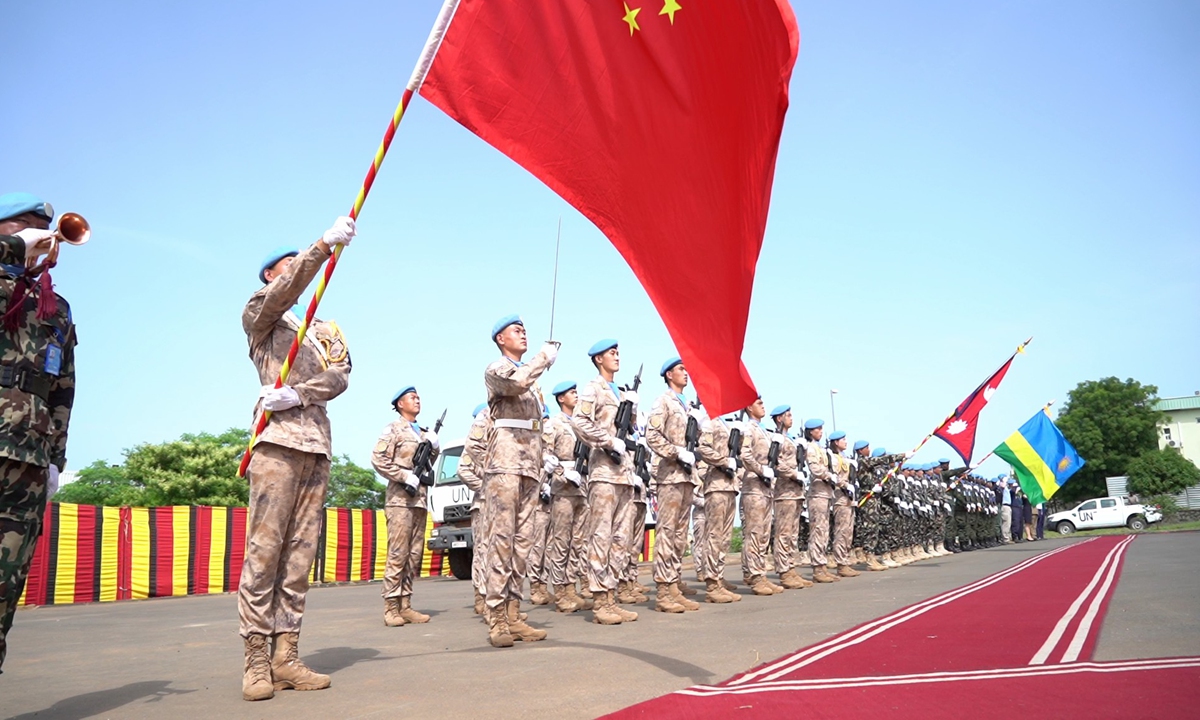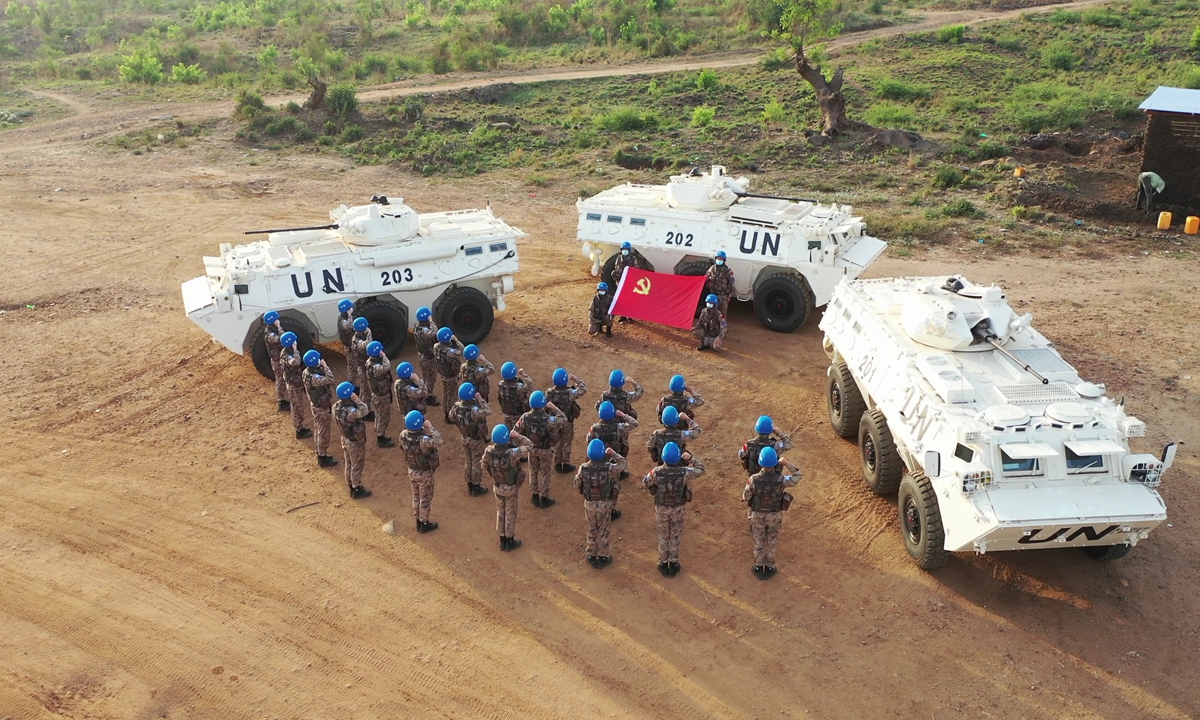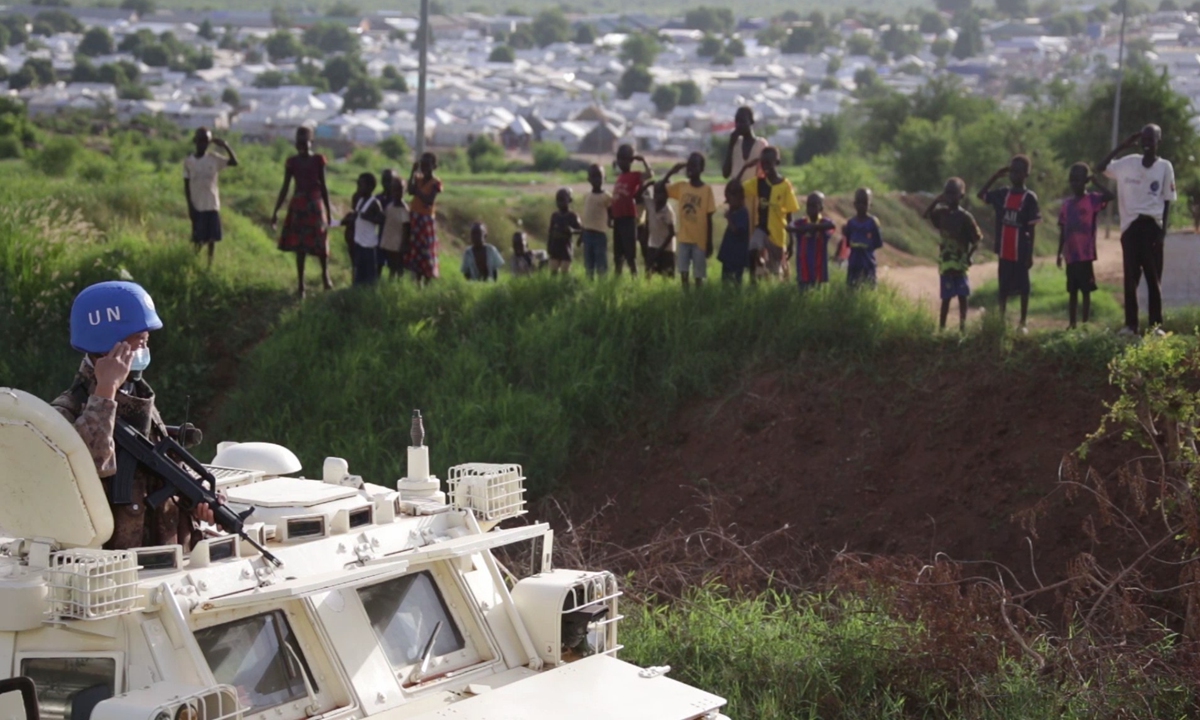China's ‘blue helmets’ on frontlines of safeguarding world peace, stability with firm commitment over decades

Honor guards of the peacekeeping infantry battalion receive inspection by Special Representative of the?Secretary-General of United Nations Mission in South Sudan and head of Department of Peace Operations in South Sudan. Photo: Courtesy of Lin Jiaxin
Editor's Note:
Looking back at the past 10 years, China has witnessed tremendous changes, which could not have been achieved without hard work of its people.
There are many ways to record the past decade, but the story that, at times, leaves a mark on each person is surely the most vivid. To welcome the 20th National Congress of the Communist Party of China, the Global Times launched a series of stories to pay tribute to people from all walks of life who have contributed their wisdom and energy to the realization of the Chinese dream.
This is the first installment in which Chinese peacekeepers share their stories about safeguarding peace and stability around the world.
Since it declared independence on July 9, 2011, the northeastern African country of South Sudan has been engulfed in civil war, with locals unable to combat hunger and poverty. To promote peace and at the invitation by the UN, China sent several batches of peacekeeping troops to South Sudan. In January 2015, the Chinese armed forces dispatched an infantry battalion of 700 troops to the United Nations Mission in South Sudan (UNMISS). Among various peacekeeping detachments, the infantry battalion is mainly responsible for missions like armed patrols, isolation of conflicts, suppression of violence and alert searches, making it the main force of peacekeeping operations and the cornerstone of security. In the past seven years, the Chinese armed forces have dispatched eight batches of peacekeeping infantry battalions to South Sudan, which have played an important role in stabilizing the situation on the ground.
The eighth batch consists of 700 officers and soldiers from the Iron Army Brigade of the Army of the Chinese People's Liberation Army Central Theater Command, with an average age of less than 26 years old. Since their deployment to the mission area in December 2021, they have been tasked with security duties and patrols in the UNMISS headquarters camp buffer zone, also known as the UN House, safeguarding peace and the hopes of nearly 70,000 ordinary people in two refugee camps outside UN House round-the-clock.
Xue Peng, now the deputy head of the external liaison team of the eighth Peacekeeping Infantry Battalion to South Sudan (Juba), has participated in peacekeeping missions in South Sudan four times since 2011. The first time was in 2011, when Xue was in the peacekeeping engineering unit to South Sudan (Wau). The engineering unit is mainly responsible for repairing and upgrading supply lines, building bridges, and providing engineering support for other peacekeeping troops in the mission area. "Our main responsibility was to help build local roads and bridges. For South Sudan, which was in desperate need of development, the infrastructure construction is very important to the restoration of local economic order. Since we deployed infantry battalions in South Sudan, we, as a combat force, can now play a role at the forefront of conflicts, allowing us to better stabilize the local situation and protect the lives of the locals."
Live ammunitions loaded
The hottest time in South Sudan can hit a sweltering 50 C. It can go lower during the rainy season from May to October, about 20 to 40 C, with the temperature at night being about 25 C. For peacekeepers, this temperature feels comfortable, but also brings troubles.
Ding Hong, the battalion commander of the eighth Peacekeeping Infantry Battalion to South Sudan (Juba), said that soldiers often encounter snakes and lizards while carrying out their duties and patrols. When the rainy season comes, mosquitoes are a particular bane. Especially during nighttime missions, soldiers could also be bitten by insects such as termites. Those bites can not only cause skin irritation, but also transmit malaria. Although the peacekeepers are vaccinated, it does not mean 100 percent protection. Secondly, the traffic conditions in South Sudan are particularly bad, as there are only a few asphalt and cement roads, and the rest are bumpy dirt roads. Ding clearly remembers that in the six days of their first long patrol, their infantry fighting vehicle had to change its tires 10 times. In the rainy season, the road conditions deteriorate further, as the roads become muddy and are covered in mud pits of different sizes. Some roads can even be completely submerged. During patrols, vehicles often sink into silt and must be towed by heavy-duty tractors.

Troops of the peacekeeping infantry battalion take oath to the Party flag in the buffer zone during an interval of a patrol mission. Photo: Courtesy of Sun Xuesong
A harsh natural environment is nothing to be feared by peacekeepers, and the bigger security challenge comes from the volatile situation in South Sudan. Although the new transitional government of South Sudan was established in February 2020, the chaos in the country has not subsided, with armed conflicts and exchanges of fire occurring regularly. The peacekeepers have become the backbone of the locals. They wear blue helmets and berets with the UN logo, and the right armbands with a world map with olive branches, symbolizing peace.
The greatest pressure for Ding, the commander of infantry, engineering, and medical peacekeeping units, is how to ensure the security of the troops. The Chinese peacekeeping infantry battalion is mainly responsible for guarding and patrolling the 15 observation and alert posts as well as the buffer zones of the UN House. In addition, it also conducts 24-hour security guard protection for important targets such as the office area of the UNMISS special representative and the accommodation area of the deputy special representative and the deputy commander of the troops. "Unexpected situations may arise at any time, such as the spread of fire caused by local conflicts and the influx of civilians. During the patrol process, troops are often blocked by checkpoints, and sometimes some unidentified armed personnel will maliciously make things difficult. For all possible situations, we have formulated targeted plans and preventive measures," Ding said.
The tension from emergencies like these is very different from rounds of simulation training. Zhang Lingqian, the leader of the female soldier squad, is on her second peacekeeping mission in South Sudan. In 2016, at the age of 22, she was a member of the third Peacekeeping Infantry Battalion to South Sudan (Juba). Before joining the army, she was a freestyle combat player for the Shandong Provincial Sports Team. Although she is more confident than other female soldiers, when she first encountered local armed forces holding weapons, she admitted that she was still very scared. "The UN House buffer zone is what was called the weapons restricted area where all forces are prohibited from carrying weapons, but we often encounter local armed forces breaking in with guns, and even robbing people with knives. In such a situation, we would immediately go into battle formation and dispatch personnel to negotiate. The atmosphere would always be very tense. At first, I was very worried and didn't know what would happen. Later, I encountered similar situations many times, it became a lot easier and flexible to handle."
Different from its two previous missions in the transport unit, the infantry battalion is the backbone of the UN peacekeeping force and a fully organized armed force, so the resistance met from the local defense forces is more obvious, Xue said. On one occasion, when Chinese peacekeepers were on a long patrol mission, according to regulations, even during the night curfew, UN vehicles could pass anywhere, but the local checkpoint staff was intransigent, preventing them from carrying out the mission. "Anything may happen, so we have made various preparations, such as reporting to the superior or coordinating with the local police. If the situation is really urgent, we must deal with it immediately. If there is a threat to life, we can load our bullets and fight back decisively."
In Zhang's female squad, the youngest soldier was born in 1999. Although everyone had psychological expectations for the harsh environment in training camp, the reality was still quite challenging. "We are all fully armed for patrol missions. Body armor is particularly heavy, not to mention the rifle, bullet bags, live ammunition clips, water bottles, and the helmets, which all add up to about 25 kilograms of extra weight. For epidemic prevention and control, we always wear masks to reduce the risk of infection and mass transmission. Each armed patrol takes at least five hours, and our clothes are entirely soaked when we return to the barracks."
Most of the UN peacekeeping troops are deployed in countries or regions in turbulence or underdeveloped economy, which brings great challenges to the work and life of peacekeepers. Over the past 30 years, nearly 50,000 Chinese troops have participated in 25 UN peacekeeping operations, covering more than 20 countries and regions around the world.

Local children salute to a convoy of the Chinese peacekeeping infantry battalion during a patrol. Photo: Courtesy of Sun Xuesong
Senses of responsibility and achievementChinese troops have a good reputation among local people in South Sudan. During a patrol, Zhang found out, "When they see Chinese peacekeepers, people on the side of the road will shout 'China, friend!' and some people will say 'Nihao,' which means hello in Chinese." This elicited powerful emotions in Xue. During his four peacekeeping missions, he could feel the changes in the local people's attitudes toward the Chinese troops, from unfamiliarity to affability, then to respect. "More and more South Sudanese people have begun to speak Chinese and actively greet us."
When Zhang first went to South Sudan, the poverty level overshot her expectation. She said "during patrols, both adults and children will reach out to us to ask for food and water." Xue said "there are hundreds of people in a village, but there is only one nurse, and the medical facilities are rather poor. We often go to local communities to carry out military-civilian coordination activities, conduct free clinics for villagers, build walls for schools, and donate books. At the end of May, the China Camp also helped local children create a football field."
In South Sudan, the rights and interests of women and children are not easily guaranteed. As a female peacekeeper, Zhang showed empathy for them. "We specially went to the villages around the camp to teach local women self-defense techniques to help them improve their safety and defense capabilities, and we also specially printed text books in English so that they could consolidate and practice the techniques." During later patrols, Zhang found that there were women in the village practicing these techniques, and she felt very relieved.
Zhang said, "It is very honorable that we have experienced things that others have not experienced, seeing that the environment in South Sudan has improved compared with the past. Locals would ask us for books and stationery. I feel very happy, because this reflects the efforts and dedication of us peacekeepers."
For all Chinese peacekeepers, everyone is under pressure and faces challenges, but there is a strong force from the motherland supporting them. "It is especially when I see locals who do not have fixed abodes. Every time I see the Chinese national flag flying high, I feel a sense of pride as a Chinese soldier. I sincerely feel the strength of the motherland and love for it, as I cherish world peace more." Ding said, "we are using our modest efforts to contribute to world peace and show the world the responsibility of the Chinese military."
Sidebar: Major activities on Chinese armed forces' participation in UN peacekeeping operations
- In December 2013, China's armed forces dispatched an engineer unit of 155 troops, a force protection unit of 170 troops and a medical unit of 70 troops to the UN Multidimensional Integrated Stabilization Mission in Mali.
- In January 2015, China's armed forces dispatched the first infantry battalion of 700 troops to UN Mission in South Sudan.
- In May 2015, China's armed forces dispatched an additional construction engineer unit of 200 troops to UN Interim Force in Lebanon.
- In June 2015, China's armed forces sent troops to participate for the first time in the Khan Quest multinational peacekeeping exercise in Mongolia.
- In June 2017, China's armed forces dispatched the first helicopter unit of 140 troops to African Union-UN Hybrid Operation in Darfur.
- In September 2017, the 8,000-strong Chinese peacekeeping standby force completed its Peacekeeping Capability Readiness System registration.
- In October 2019, a grand celebration was held in Beijing to mark the 70th anniversary of the founding of the People's Republic of China. The Chinese military peacekeepers were reviewed by the country and the people for the first time in a National Day military parade.

